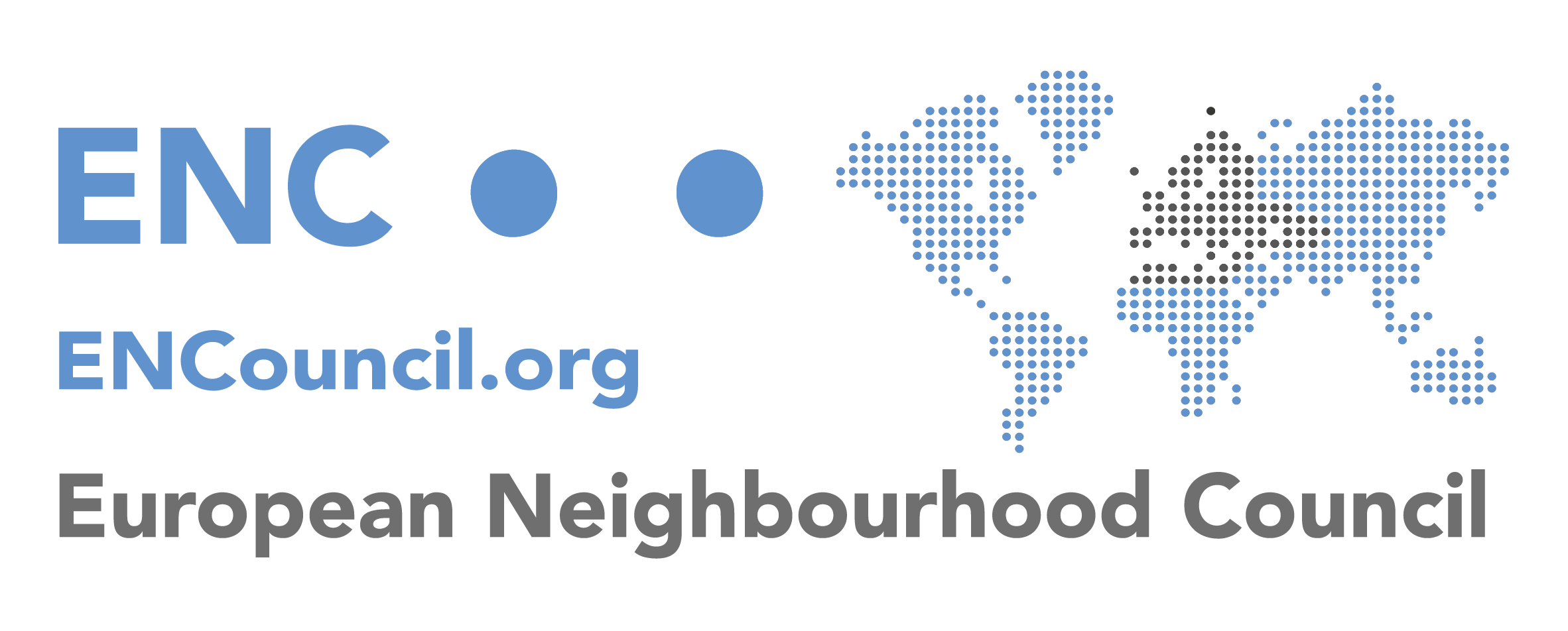Beyond Erasmus: Education, Exchanges and Employment opportunities for youth in the EU and Turkey (Phase I)
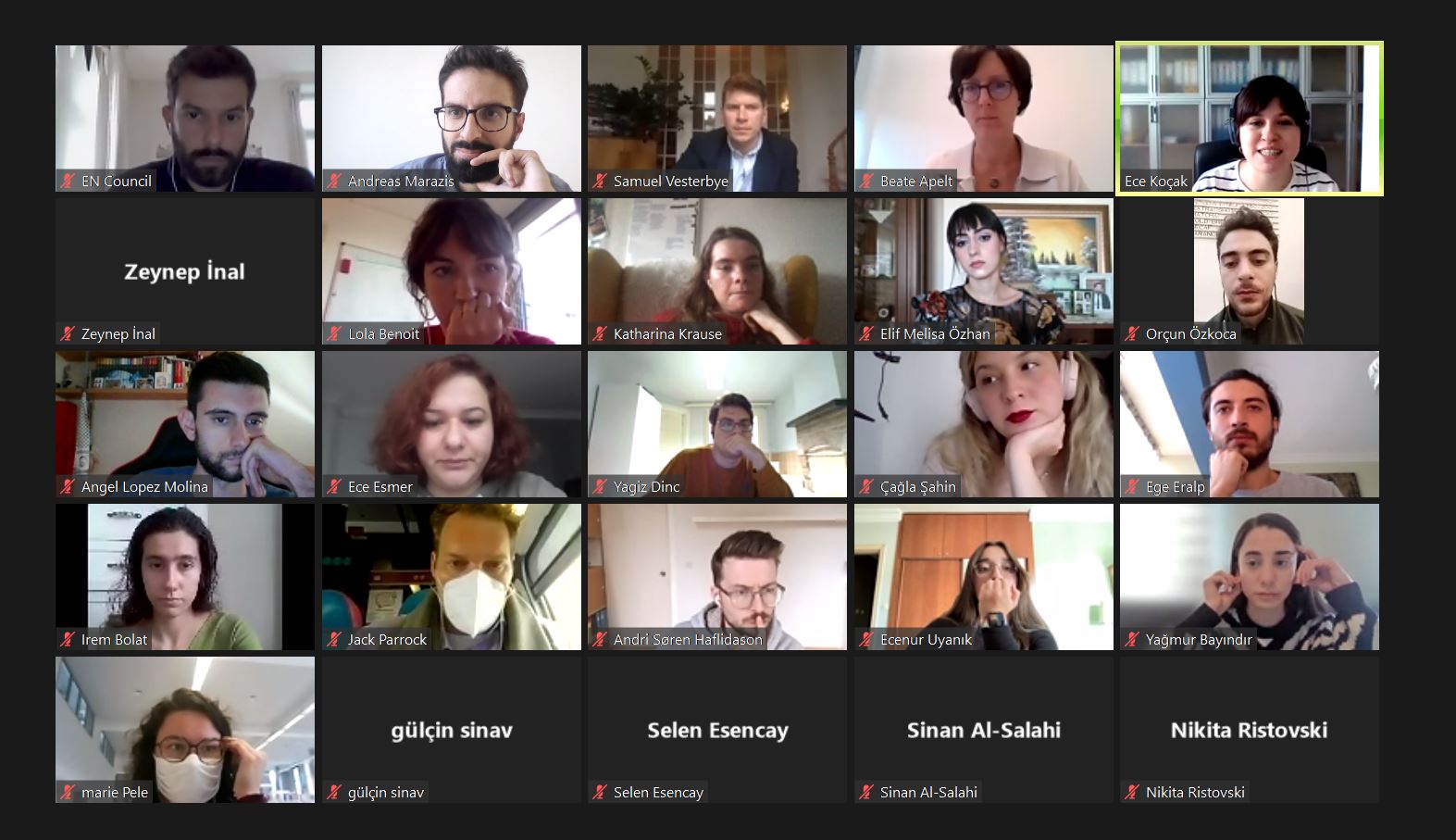
The European Neighbourhood Council (ENC), in cooperation with the Friedrich Naumann Foundation (FNF) office in Turkey has recently concluded the first of a phase of a hybrid educational programme titled “Beyond Erasmus: Education, Exchanges and Employment opportunities for youth in the EU and Turkey”. The project promotes Erasmus+ student mobility, youth exchanges, internships, training courses, networking, access to funding for Small and Medium Enterprises (SMEs), free market entrepreneurship and Civil Society Organisations (CSO).
The project aims to create exchanges with a focus on entrepreneurship, innovation, further training and career prospects for youth in EU and Turkey. Participants from Belgium, Germany, France, the Netherlands and Turkey gained skills in the private, civil society and public sector, while staying anchored to EU legislation, strategies and new priority topics. Throughout the sessions, participants were encouraged to support each other and develop their professional networks. Against the current context of Turkish isolation, the project had a strong focus on establishing lasting friendships and exchanging ties as well as instilling skills, instruments and future financial options within the participants to support liberal universal values and cementing ties between the EU and Turkey.
During the first phase (October-November 2021) 40 participants – mainly young graduates – from Turkey, Belgium, France, Germany and the Netherlands – attended a series of six online training sessions engaging with inspiring and talented professionals from Europe and Turkey working in media, audiovisual, think tank, Civil Society, European Commission, Academia and private sector.
After University: What now? Employment opportunities, academic career, CSOs, internships

The first session allowed participants to meet with successful professional figures, from the art and entertainment sectors, as well as civil society and journalism. The session featured the insights of three experts who shared their experiences, stories and lessons learned from working in different professions both in the EU and Turkey, while providing useful “dos and don’ts” tips regarding their respective professions.
Asli Ece Kocak (Communication Officer at the Truth Justice Memory Center) talked about her experiences in the civil society sector, employment opportunities in Turkey in this specific field and how the situation has changed during the last years in relation with the political changes in the country. Andri Haflidason (Musician and visual artist) advised the participants to invest time on what they want to do, even if they don’t generate an income they create opportunities for future employment, while Jack Parrock (Journalist Correspondent for Deutsche Welle) provided personal insights from the world of media and advised those who want to pursue a career in journalism to always sharpen their skills (language, writing, camera, presentation etc.).
“CV Writing and Interview Skills – Personal Brand Building”
g
The second session allowed participants to get valuable information on CV writing, job interviews and other practical lessons. During a highly interactive course our group had the opportunity to engage and learn from two experts in the field of human resources and job applications.
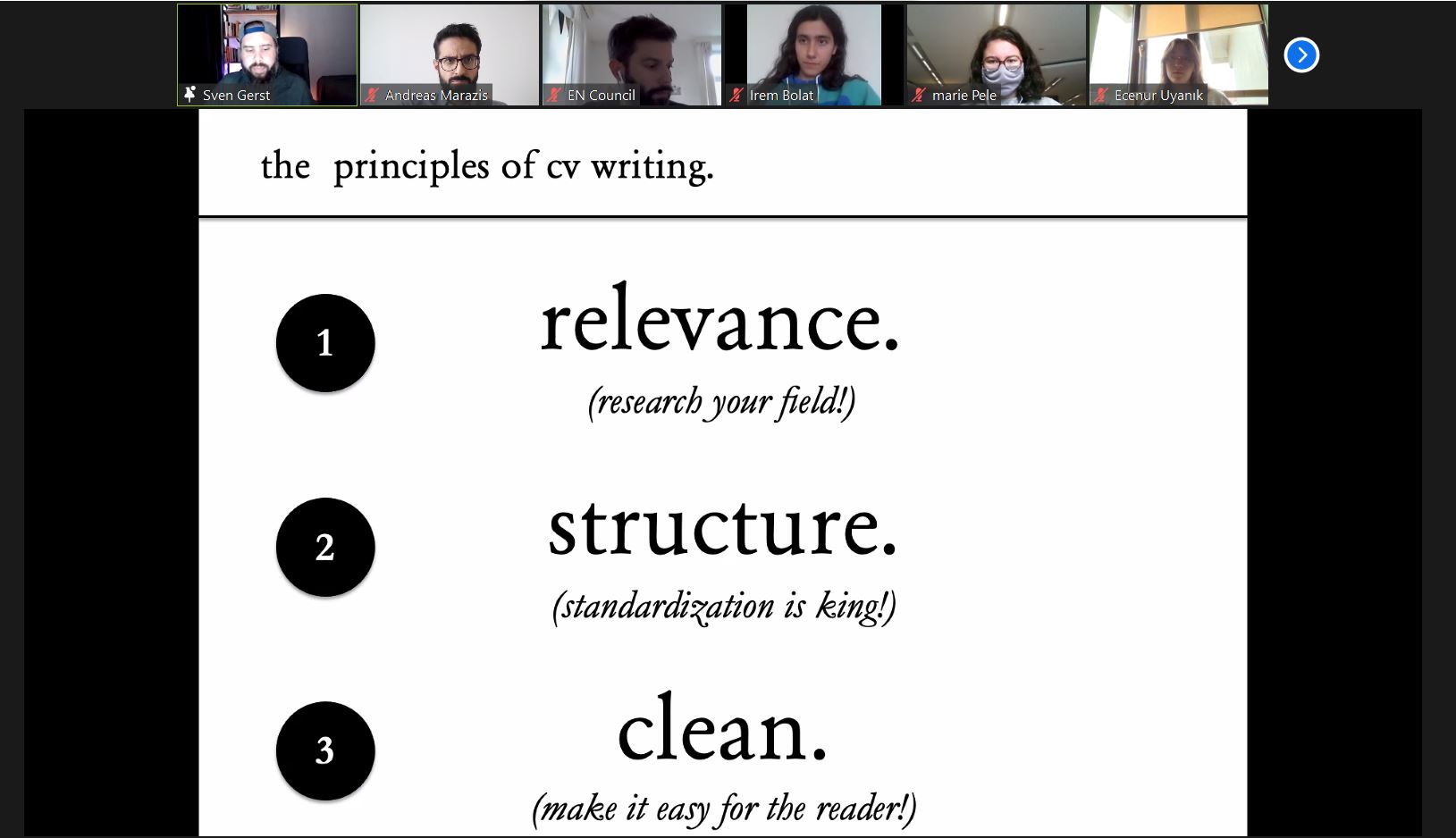
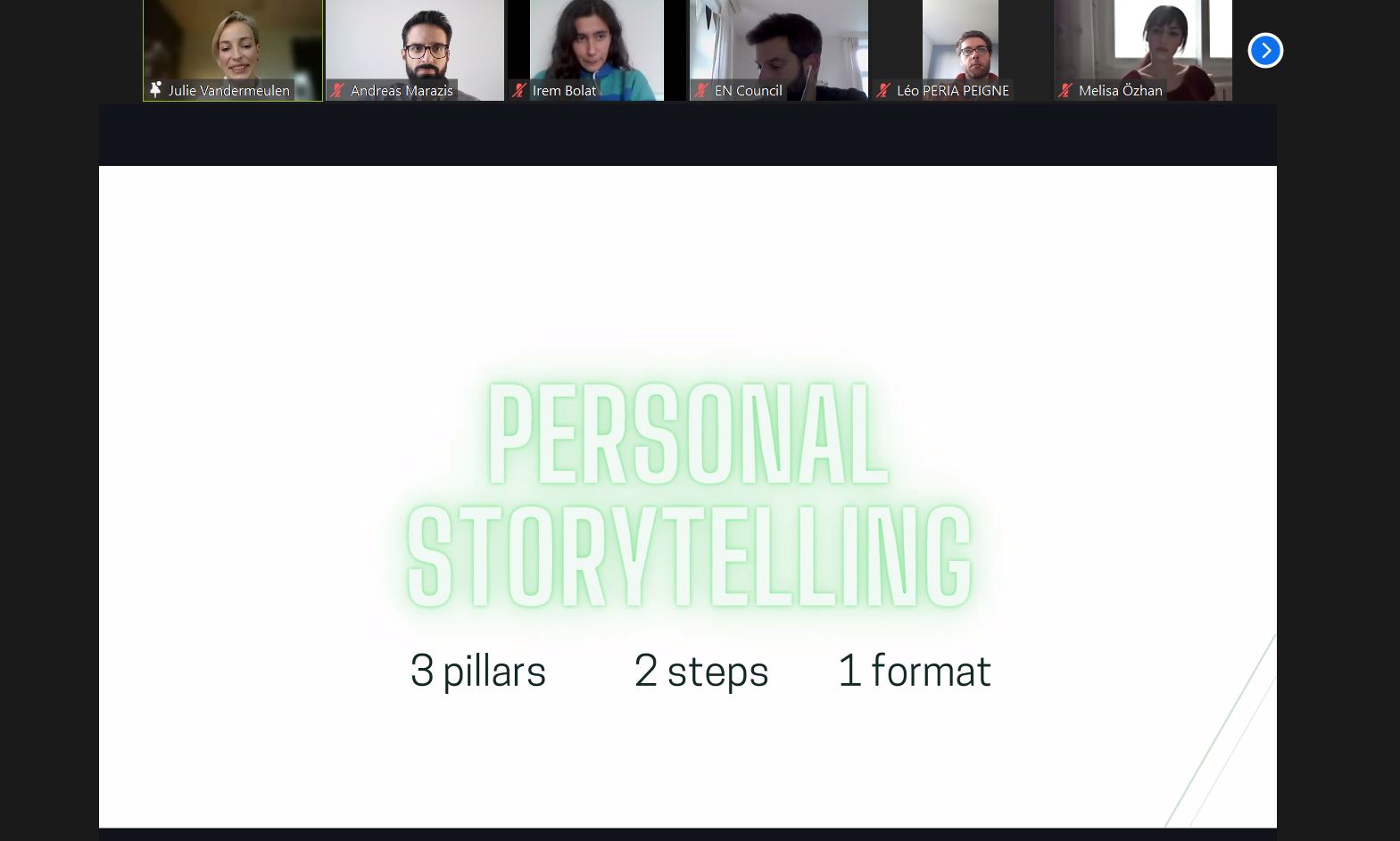
Sven Gerst (PhD candidate in Political Philosophy at the Department of Political Economy at King’s College in London) shared his experience in academic, business and CSO CV writing. He highlighted that every CV should be constructed based on the specific needs of the position you apply for, give emphasis on your achievements and follow the three main principles of relevance, structure, and clean text. Julie Vandermeulen (Head of Storytelling at Rise and Founder of Clarity Kit) advised the participants that their professional story should be developed initially as a blueprint, it must be clear, convincing and memorable in order to be conveyed in a wider audience.
Access to Funding I
The third session focused on fundraising and further learning in Turkey with EU support after Erasmus. Participants were able to meet and learn from experts in EU fundraising and other learning opportunities in Turkey, including job opportunities in EU-based CSO’s on democracy, media freedom, anti-corruption, privacy, and GDPR.
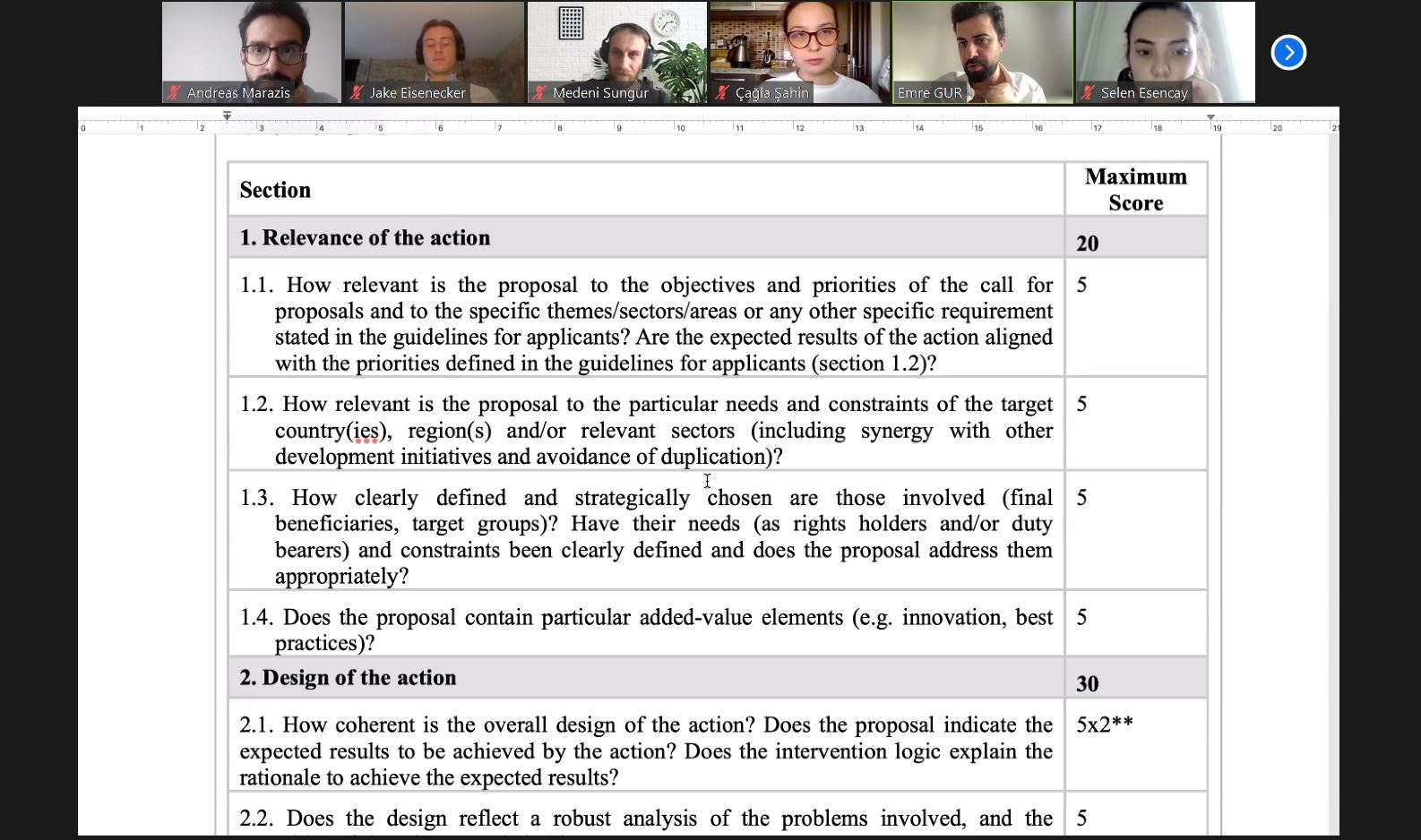
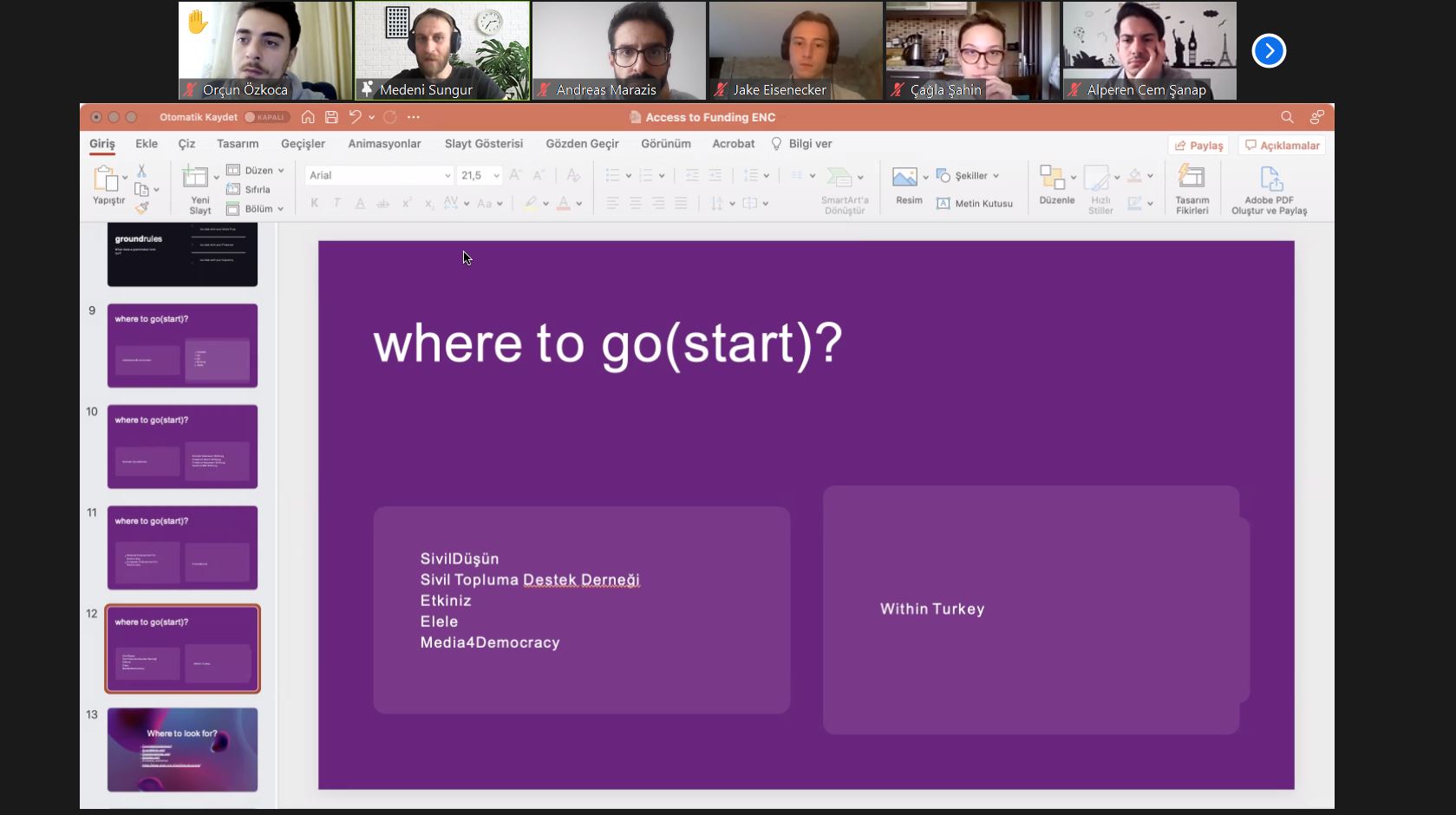
Emre Gür (Key expert at EU Think Civil – Sivil Düşün – Programme) talked about the Instrument of pre-accession assistance (IPA) programmes. He noted that the IPA is constructed from the following components i) assistance for transition and institution building, ii) cross – border cooperation, iii) regional development iv) human resources, vi) rural development. Mr. Gür spoke in more detail about two specific programmes: a) COSME which supports entrepreneurs by strengthening education, mentoring, guidance and other support services and b) Creative Europe programme which has two sector initiatives. The Culture sector initiatives, such as those promoting cross-border cooperation, platforms, networking, and literary translation. The Audiovisual sector initiatives, such as those promoting the development, distribution, or access to audiovisual works. Medeni Sungur (Founder of Kuest Media) devoted more attention to fundraising sources such as, major individual donors, campaigns, planed giving, capital campaigns, government entities and crowdfunding among others. He guided the participants through the initial preparation phase of a fund application and provided them with the initial know – how of fundraising blueprint.
Access to Funding II
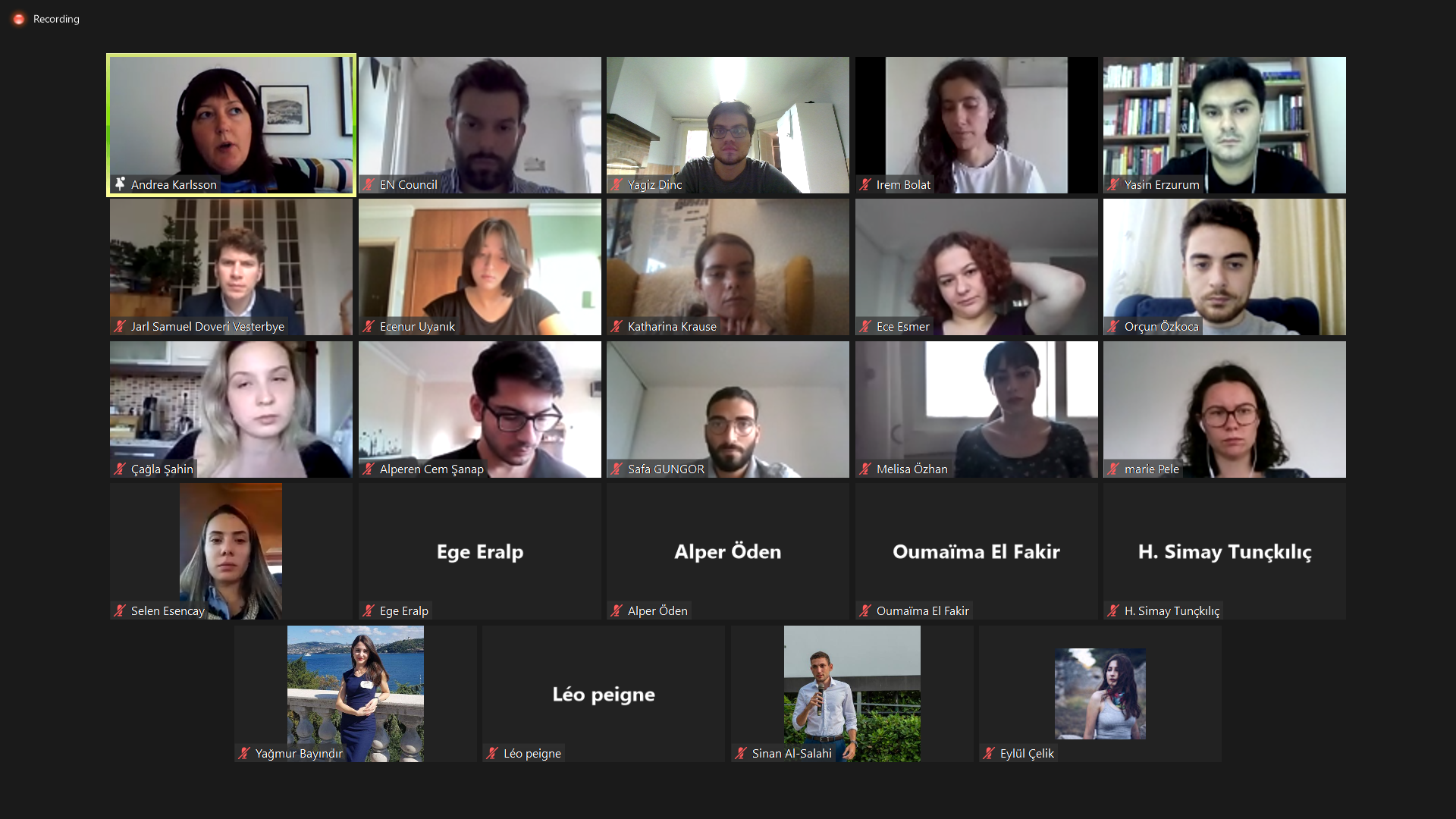
The fourth session focused once more on the fundraising opportunities but this time it looked into access to funding from a top-down angle. Starting with the European Commission and the political process between the EU and Turkey, to how important it is to understand the different dimensions regarding funds towards, public institutions, academia and civil society.
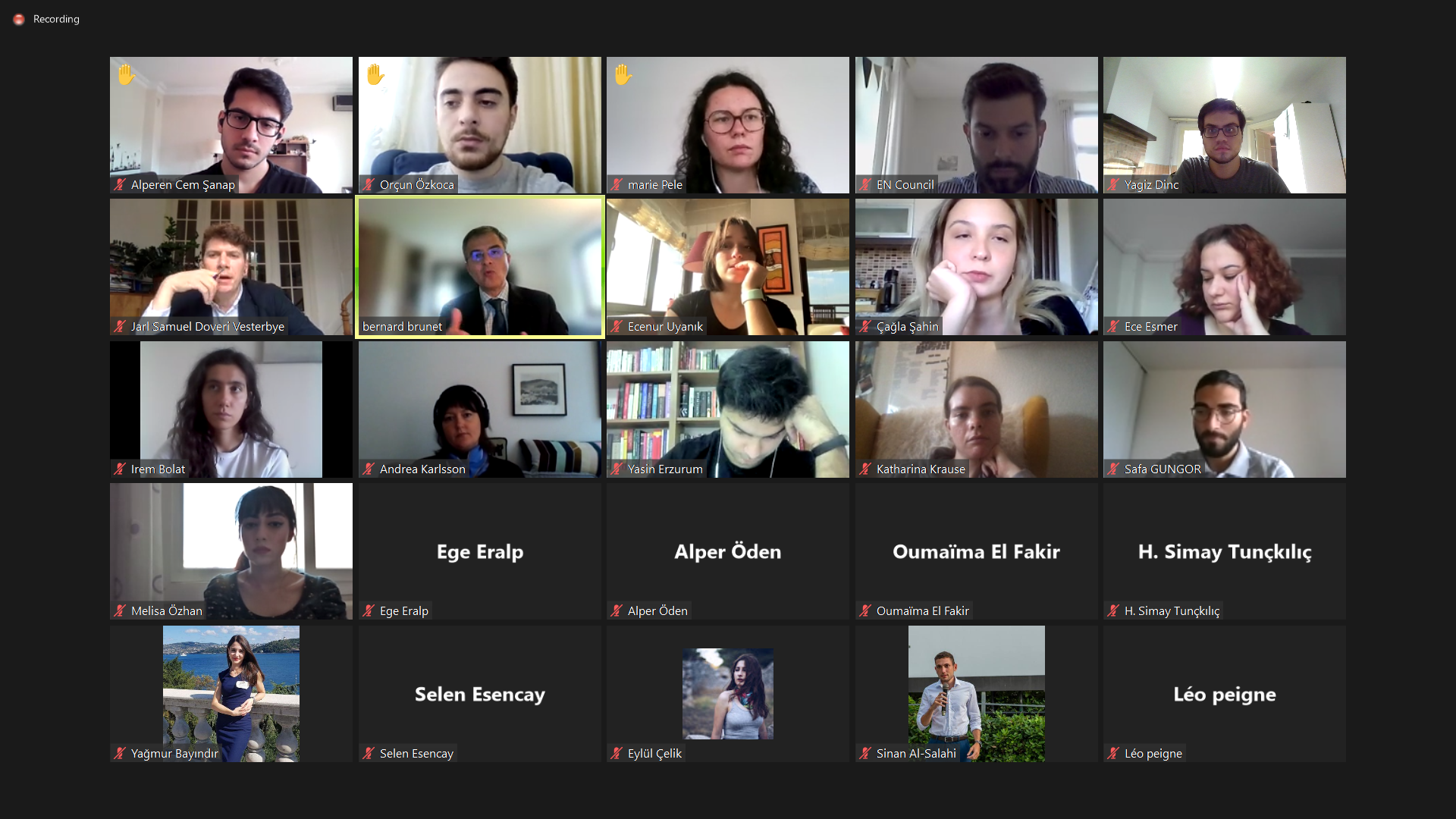
Bernard Brunet (Head of the Unit at DG Near – Strategy and Turkey) talked about the political and economical situation between EU and Turkey and how it has evolved in recent years. He highlighted that the recent political developments in Turkey especially regarding the parliament and judiciary system have been weakened systematically which results in non-cooperation in key areas such as the human rights, fundamental freedoms and rule of law among others. Furthermore, he added that the difficult economic reality of Turkey is indicating that a wider part of the population is faced with harsh economic circumstances. Andrea Karlsson (Programme Manager at the European Endowment for Democracy) shared her professional experiences in the CSO field and advised the participants to search beyond the EU initiated funding programmes. She spotlighted that there are numerous professional fields that can engage in funding opportunities regarding EU-Turkey programmes, thus by having a mixture of academic or professional skills is always an advantage.
“The Future of Economy and Entertainment”
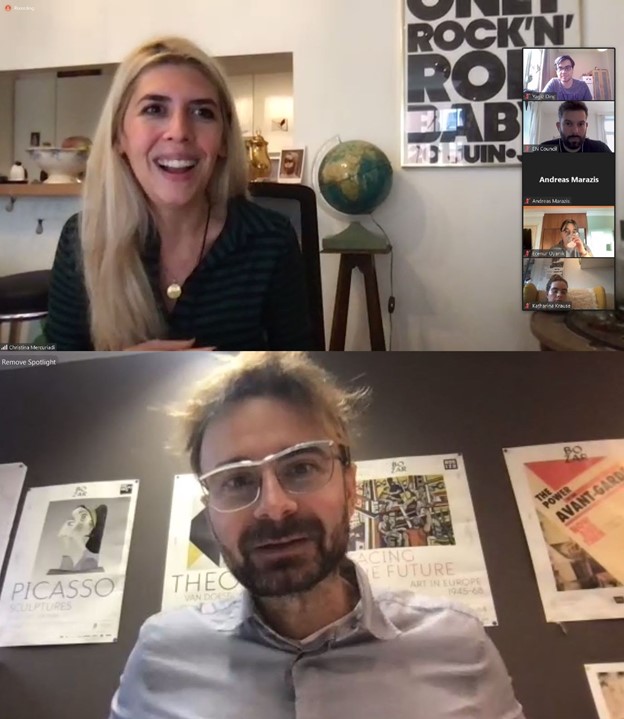
The fifth session enabled participants to engage with a panel of experts on topics ranging from employment, society, politics, economics and innovation. The session aimed at highlightign themes and topics which will be relevant societally and also in terms of employment for the future. The discussion focused on technology, data, information, entertainment, privacy, and health.
Christina Mercuriadi – Director of EU Affairs at Motion Picture Association and Giuseppe Porcaro – Head of Outreach and Governance at Bruegel devoted particular attention to the challenges that the COVID-19 pandemic has created for their field of work but also for the general world wide economy. The discussion evolved around the importance of technology and entertainment in which both of the speakers underscored the relevance of enriching your skills either through trainings or by pursuing a second or third degree in a relevant field of their work. By following an AI or law-related degree, depending on someone’s academic or early professional background, they will have the opportunity to work across and within different sectors that interest them, the interconnectedness of different work fields today is more relevant than ever.
EU-Turkey Relations
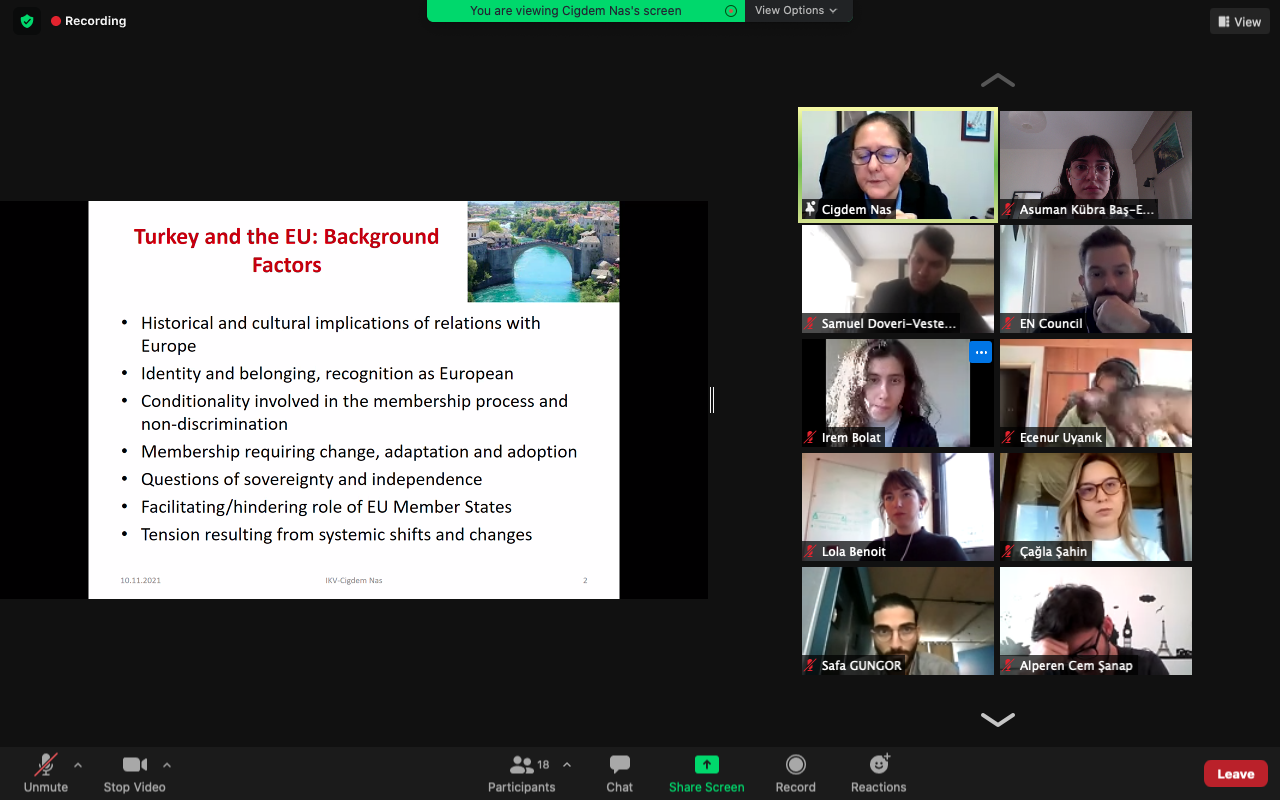
The sixth and final session examined the historical, economical, and cultural relations between the EU and Turkey. The session aimed to understand the reasons of what went wrong, and encouraged participants to think how previous mistakes can be avoided, tackled and improved by the new generations.
Çiğdem Nas (Secretary General at the Economic Development Foundation) talked about the EU – Turkey long historical relations and how those have evolved especially the prism of the Association Agreement. Mrs. Nas devoted particular attention to the problems that arise through the Association Process agreement, especially from the EU side such as the integration capacity, the enlargement fatigue, the rise of Euroscepticism and the populist rise on right-wing politics in the EU. The ongoing standstill in relations between Cyprus and Turkey which have international complications and stretch beyond the boundaries of it, and including the rising frictions in the Eastern Mediterranean between Turkey and Greece, are halting all progress that the EU and Turkey can have. Samuel Doveri Vesterbye (Managing Director of the European Neighbourhood Council), recognized that the initial far-fetched attempt regarding Turkey’s rapid accession to the EU through the Ankara Agreement created an enormous, entangled political mess. Mr. Vesterbye, noted also the positive side of the EU – Turkey relations, which apart from the obvious geopolitical and connectivity reasons, Turkey will benefit by the general diversity of the Union.
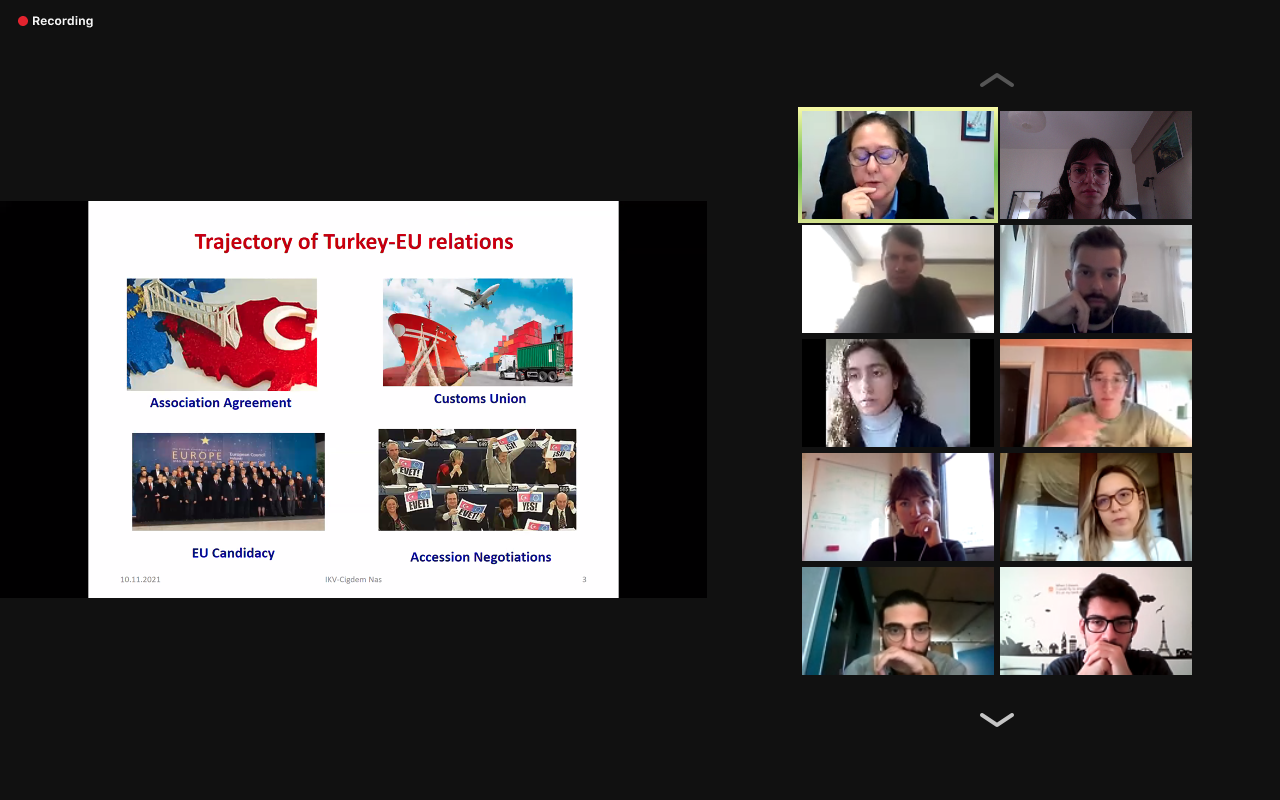
Concluding, apart from the online sessions, the first part of the Beyond Erasmus programme also included the preparation of a project proposal assignment, which through it, the participants will compete for the second round of the Beyond Erasmus programme. The top eight finalists, four from the EU and four from Turkey, based on gender balance, will be welcomed in Brussels during February 2022 for an educational one-week networking trip. Finally, the third phase of the Beyond Erasmus programme will conclude with the delivery of four lectures which will take place in two Turkish Universities and two EU-based academic institutions. Stay tuned with ENC to find out more about the upcoming activities of our Beyond Erasmus projects during 2022.
